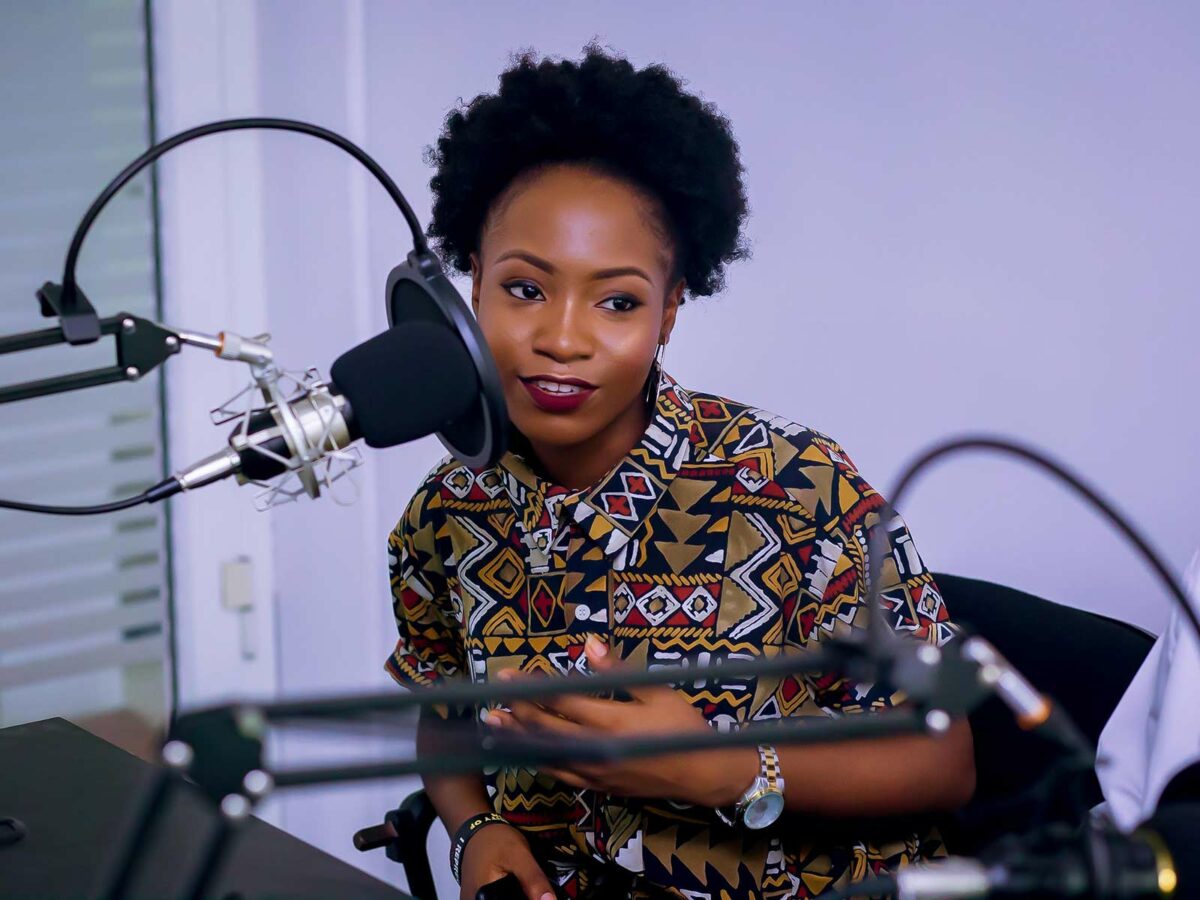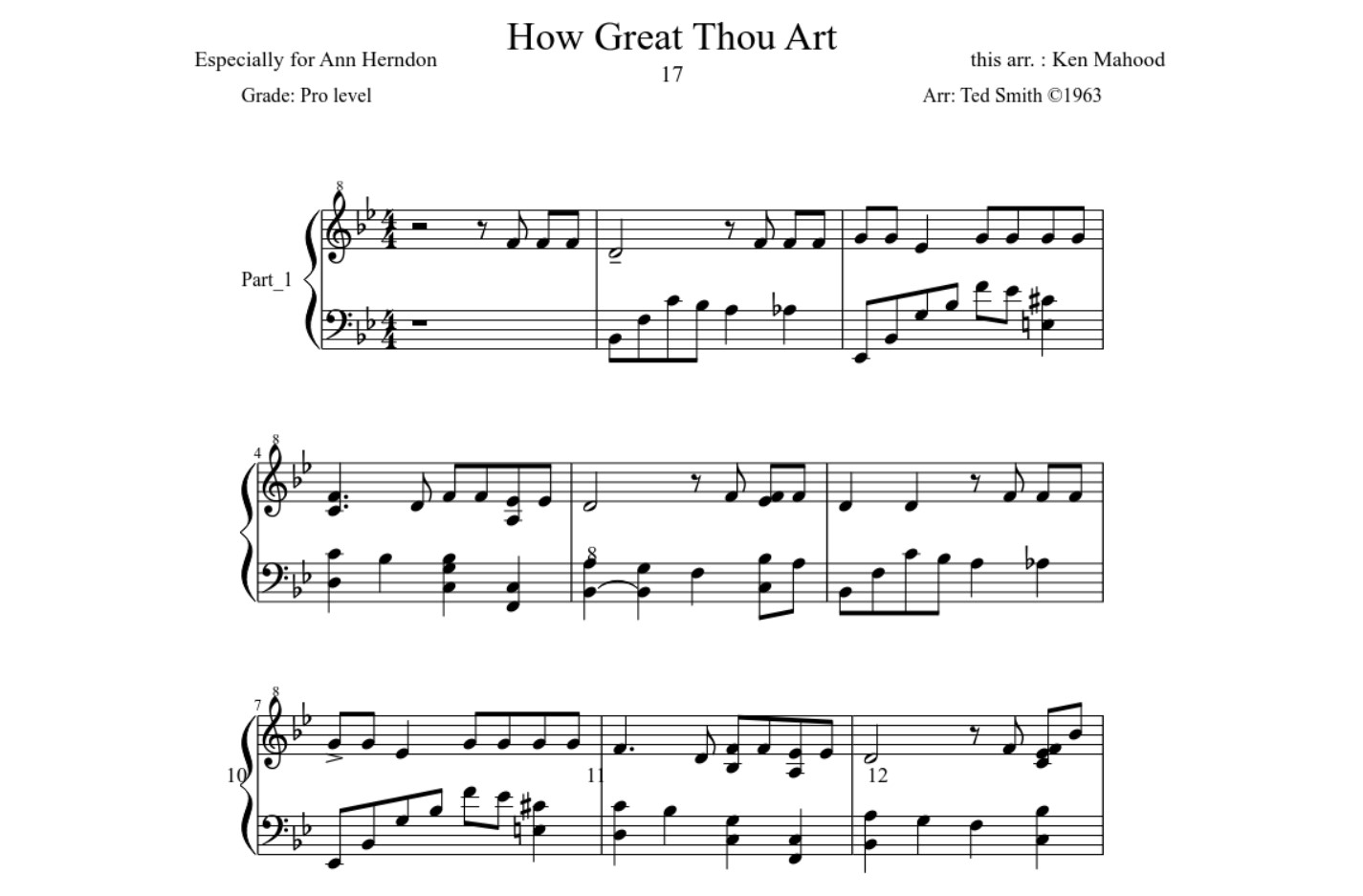Home>Events & Info>Podcast>How To Start A Solo Podcast


Podcast
How To Start A Solo Podcast
Modified: February 5, 2024
Learn how to start your own solo podcast and share your passion with the world. Get expert tips and advice on podcasting to create engaging content.
(Many of the links in this article redirect to a specific reviewed product. Your purchase of these products through affiliate links helps to generate commission for AudioLover.com, at no extra cost. Learn more)
Table of Contents
- Introduction
- Step 1: Choose Your Podcast Niche
- Step 2: Plan Your Podcast Format
- Step 3: Gather the Necessary Equipment
- Step 4: Set Up Your Recording Space
- Step 5: Create Your Podcast Artwork and Intro Music
- Step 6: Find a Reliable Podcast Hosting Platform
- Step 7: Record and Edit Your First Episode
- Step 8: Submit Your Podcast to Directories
- Step 9: Promote Your Podcast on Social Media and Other Platforms
- Step 10: Engage with Your Audience and Consistently Release New Episodes
- Conclusion
Introduction
Welcome to the world of podcasting, where you can share your thoughts, ideas, and expertise with a global audience. Podcasting has rapidly gained popularity over the years, with millions of listeners tuning in to their favorite shows on a regular basis. If you have a passion for storytelling, knowledge to share, or a unique perspective to offer, starting your own solo podcast can be a rewarding and fulfilling endeavor.
A solo podcast is a format where you, as the host, take center stage and deliver engaging content to your audience. Unlike a co-hosted podcast, where multiple individuals share the hosting duties, a solo podcast allows you to fully showcase your expertise and create a more intimate connection with your listeners. Understanding how a podcast works in this context allows you to leverage the medium to its fullest potential. It’s an opportunity to establish yourself as an authority in your niche, cultivate a loyal following, and even monetize your podcast.
While the prospect of starting a podcast may seem daunting at first, the process can be simplified with the right guidance. In this article, we’ll walk you through the essential steps to start your own solo podcast, from choosing your niche to promoting your episodes. So, grab your microphone and let’s dive in!
Step 1: Choose Your Podcast Niche
Choosing the right podcast niche is crucial for the success of your solo podcast. It’s important to select a topic that you are passionate about and have in-depth knowledge or expertise in. This will not only make the podcasting journey more enjoyable for you but also attract like-minded listeners who are genuinely interested in your content.
Start by brainstorming different topics or areas that you find fascinating. It could be a hobby, a profession, a specific genre, or even a niche within a broader subject. Consider your unique perspective or angle that will set your podcast apart from others in the same space. Think about the kind of audience you want to attract and the type of conversations you want to have.
Additionally, conduct some market research to assess the demand and competition within your chosen niche. Look for popular podcasts or existing shows similar to your idea and analyze their content, audience engagement, and overall success. This will give you valuable insights into what works and what you can bring to the table.
Remember, your podcast niche doesn’t have to be overly broad or too narrow. Finding the right balance is key. A niche that is too broad may make it harder to stand out, while a niche that is too narrow may limit your audience reach. Look for the sweet spot where you can provide valuable and unique content while still appealing to a sizable audience.
Once you have chosen your podcast niche, it’s time to move on to the next step: planning your podcast format.
Step 2: Plan Your Podcast Format
Planning your podcast format is essential for creating a cohesive and engaging show. It involves determining the structure, length, and style of your episodes. Taking the time to plan your format in advance will help you stay organized and ensure a consistent and enjoyable experience for your listeners.
Here are a few considerations to keep in mind when planning your podcast format:
- Episode Structure: Decide on the overall structure of each episode. Will you have a specific theme or topic for each episode, or will you have a more conversational format? Will you include segments or recurring features?
- Episode Length: Determine the ideal length for your podcast episodes. Consider factors like your topic, audience preferences, and the amount of content you have to share. Aim for a duration that allows you to deliver valuable insights without losing your listeners’ attention.
- Episode Frequency: Decide on how often you will release new episodes. This could be weekly, bi-weekly, or monthly, depending on your availability and the amount of time required for content creation and production.
- Interviews or Solo Episodes: Determine if you will have guests on your show or if you prefer to host solo episodes. Figure out how to get guests for your podcast if you choose to include interviews. Each approach has its advantages, and you can even mix both formats to add variety to your content.
- Scripted or Improvised: Consider whether you will script your episodes, have a loose outline, or prefer a completely improvised style. Find a balance that allows for spontaneity while ensuring a clear and coherent delivery.
Planning your podcast format is an iterative process, and you can always make adjustments along the way based on listener feedback and your own preferences. The key is to have a solid foundation that guides your episodes and helps you maintain consistency.
Once you have planned your podcast format, it’s time to gather the necessary equipment for recording.
Step 3: Gather the Necessary Equipment
Gathering the necessary equipment is an important step in starting your solo podcast. While professional podcasting setups can get quite elaborate, especially for high production value shows, you don’t need to break the bank to get started. With a few essential pieces of equipment, you can achieve great sound quality and a professional-sounding podcast.
Here are the key pieces of equipment you’ll need:
- Microphone: Invest in a good-quality microphone to ensure clear and crisp audio. USB condenser microphones, such as the Blue Yeti or Audio-Technica ATR2100x, are popular choices for podcasters due to their ease of use and reasonable price.
- Headphones: Use headphones to listen to your audio while recording. This helps you monitor the sound quality and catch any issues or background noise. Look for closed-back headphones that offer good noise isolation.
- Pop Filter: A pop filter is a screen that attaches to your microphone to reduce plosive sounds (like “p” and “b” sounds) that can cause distortion. It helps produce cleaner audio and is a relatively inexpensive accessory.
- Boom Arm or Mic Stand: A boom arm or mic stand allows you to position your microphone at the correct height and angle. This helps you maintain good posture and optimal mic placement, resulting in improved sound quality.
- Acoustic Treatment: Consider adding some basic acoustic treatment to your recording space. This can include foam panels or bass traps to reduce echo and background noise, resulting in a cleaner sound.
- Pop Filter: A good-quality pair of closed-back headphones is essential. They will help you monitor your audio while recording and ensure you can catch any issues or background noise.
- Audio Interface: If you decide to use an XLR microphone instead of a USB one, you’ll need an audio interface to connect your microphone to your computer. Focusrite Scarlett and PreSonus AudioBox are popular entry-level audio interface options.
- Recording Software: Use a digital audio workstation (DAW) to record and edit your podcast episodes. Popular options include Audacity (free), Adobe Audition, or GarageBand (for Mac users).
Once you have gathered the necessary equipment, it’s time to set up your recording space, ensuring optimal sound quality and a comfortable environment for podcasting.
Step 4: Set Up Your Recording Space
Creating a suitable recording space is essential to ensure high-quality audio for your solo podcast. While you may not have access to a dedicated soundproof studio, there are several steps you can take to optimize your recording environment.
Here are some key considerations when setting up your recording space:
- Select a Quiet Location: Choose a room or area in your home that experiences minimal outside noise. Avoid rooms with echo-prone surfaces, like tiled bathrooms or empty concrete basements, as they can negatively affect your audio quality.
- Clear the Space: Remove any clutter, furniture, or objects that may cause unwanted reflections or vibrations. A clean and uncluttered space will help improve the sound absorption in the room.
- Add Soundproofing Elements: If possible, consider adding soundproofing elements to the recording space. This can include foam panels, acoustic tiles, or even hanging blankets to reduce echoes and background noise. Focus on treating the areas around the microphone and the walls facing you.
- Control External Noise: Install blackout curtains or use acoustic curtains to block out external noise, such as traffic or neighbors. Consider using a noise gate in your recording software to eliminate background noise during pauses in your speech.
- Avoid Hard Surfaces: If your recording space has hard surfaces like wooden floors or glass windows, place rugs, carpets, or curtains to help absorb the reflections and reduce reverb. Breaking up the flat surfaces will help improve the overall sound quality.
- Position Yourself and the Microphone: Sit in a comfortable position with good posture and position the microphone at the correct distance from your mouth. Experiment with microphone placement to find the sweet spot that captures your voice clearly and minimizes any unwanted noise or popping sounds.
Remember, creating a perfect recording environment may not be feasible for everyone, especially when starting out. The goal is to minimize distractions and optimize the sound quality as much as possible within your available resources.
Once your recording space is set up, it’s time to move on to the creative elements of your podcast, such as creating your podcast artwork and intro music.
Step 5: Create Your Podcast Artwork and Intro Music
Your podcast artwork and intro music play a crucial role in attracting listeners and setting the tone for your show. They are the visual and auditory representations of your podcast’s brand and should reflect the essence of your content. Creating compelling artwork and a catchy intro is essential for making a strong first impression and enticing people to click on your episodes.
Here are some tips when creating your podcast artwork:
- Visual Appeal: Design artwork that is visually appealing and eye-catching. Use bold colors, clear and legible text, and high-quality images or illustrations that represent your podcast’s theme or niche.
- Consistent Branding: Ensure your artwork aligns with your podcast’s branding. Use consistent fonts, colors, and icons that reflect the tone and personality of your show. The artwork should be recognizable as yours across different platforms.
- Simple and Clear: Keep the artwork simple and avoid clutter. It should be easily recognizable, even in a small thumbnail size. Balance striking visuals with clear messaging to convey what your podcast is about.
- Follow Platform Specifications: Different podcast directories and platforms have specific requirements for artwork dimensions and file formats. Make sure to adhere to these guidelines to ensure your artwork looks its best across different platforms.
When it comes to intro music, consider the following:
- Catchy and Memorable: Choose intro music that is catchy and memorable. It should capture the essence of your podcast and create a sense of anticipation for the upcoming episode.
- Reflect Your Style: Consider the tone and style of your podcast when selecting intro music. If your show is upbeat and energetic, choose music that reflects that vibe. If it’s more serious or informative, select music that sets a more focused and thoughtful mood.
- Keep it Short: Aim for an intro music length of around 10 to 15 seconds. Anything longer may feel excessive and can potentially lead to listener fatigue.
- Customize or License: You can either create your own intro music using audio editing software or license royalty-free music from platforms like PremiumBeat or Artlist. Ensure that you have the necessary licenses and permissions for any music you use.
Once you have created your podcast artwork and intro music, you can move on to the technical aspect of podcasting: finding a reliable podcast hosting platform.
Step 6: Find a Reliable Podcast Hosting Platform
A podcast hosting platform is crucial for storing, distributing, and managing your podcast episodes. It acts as the bridge between your podcast and various podcast directories, making it accessible to listeners around the world. When choosing a hosting platform, reliability, features, pricing, and ease of use are important factors to consider.
Here are some key aspects to keep in mind when selecting a podcast hosting platform:
- Reliability and Uptime: Opt for a hosting platform that has a strong reputation for reliable service and minimal downtime. You want your episodes to be readily available to your audience without any technical glitches.
- Distribution to Podcast Directories: Ensure the platform you choose can easily distribute your podcast to major directories like Apple Podcasts, Spotify, Google Podcasts, and others. This will ensure maximum visibility and accessibility for your show.
- Analytics and Statistics: Look for a hosting platform that provides in-depth analytics and statistics on your podcast’s performance. This includes metrics like downloads, subscriber growth, and listener demographics. Understanding these metrics will help you make informed decisions for your podcast’s growth.
- Customization and Branding: Consider whether the hosting platform allows you to customize your podcast’s website and easily incorporate your branding elements. This will help create a consistent look and feel for your podcast across different platforms.
- Monetization Options: If you plan to monetize your podcast through sponsorships or advertising, check if the hosting platform offers built-in monetization features or integrates with third-party monetization tools.
- Ease of Use: Choose a hosting platform with a user-friendly interface and intuitive backend. Uploading, scheduling, and managing episodes should be effortless and streamlined.
- Customer Support: Assess the level of customer support provided by the hosting platform. It’s important to have responsive and helpful support available in case you encounter any technical issues or have questions.
- Pricing: Consider your budget and compare the pricing plans offered by different hosting platforms. Take into account the features included in each plan to ensure you choose the one that aligns with your needs and budget.
Some popular podcast hosting platforms to consider are Podbean, Libsyn, Buzzsprout, and Anchor. Do your research, read reviews, and choose the platform that best suits your podcasting goals and requirements.
Once you have selected a hosting platform, you can move on to the next step: recording and editing your first podcast episode.
Step 7: Record and Edit Your First Episode
With your podcast hosting platform secured, it’s time to dive into the exciting process of recording and editing your first episode. Whether you’re a seasoned pro or new to the world of podcasting, following some key steps can help you create a polished and professional podcast episode.
Here are some tips to guide you through the recording and editing process:
- Preparation: Before hitting the record button, prepare an outline or script for your episode to ensure a smooth flow of content. Gather any research or talking points you want to cover, and make sure you have a quiet and distraction-free space ready for recording.
- Microphone Technique: Position your microphone correctly and maintain consistent distance and volume levels throughout the recording. Practice good microphone technique by speaking clearly and avoiding popping sounds by using a pop filter.
- Speak Naturally: While following your outline or script, aim for a conversational and engaging tone. Be yourself and let your personality shine through. Listeners appreciate authenticity and a natural flow of conversation.
- Editing: Once you’ve recorded your episode, use audio editing software like Audacity, Adobe Audition, or GarageBand to refine the audio. Remove any mistakes, pauses, or background noises, and ensure a consistent volume level throughout.
- Intro and Outro: Add your podcast’s custom intro music and create an outro that includes important information such as your website, social media handles, and a call to action for listeners.
- Transitions and Segments: Use transitions and segment markers to divide your episode into easily digestible sections. This helps improve the flow and organization of your content and makes it easier for listeners to follow along.
- Music and Sound Effects: If desired, incorporate additional music or sound effects to enhance certain sections or add a creative touch to your episode. However, use them sparingly and make sure they complement and enhance the overall listening experience.
- Quality Check: Before finalizing your episode, listen to the edited version from start to finish to ensure the audio is clean, balanced, and free from any glitches or technical issues.
Remember, the editing process can be time-consuming, but it’s essential for delivering a seamless and professional episode. Take your time, listen attentively, and make necessary adjustments to create the best possible final product.
Once you’re satisfied with the editing, it’s time to move on to the next step: submitting your podcast to directories and making it accessible to a wider audience.
Step 8: Submit Your Podcast to Directories
Submitting your podcast to directories is a crucial step in gaining exposure and making your podcast accessible to a wider audience. Podcast directories are platforms where listeners discover and subscribe to podcasts. By getting your podcast listed on these directories, you increase its visibility and reach.
Here’s how you can submit your podcast to directories:
- Apple Podcasts: Apple Podcasts (previously known as iTunes) is one of the most popular podcast directories. Create an Apple ID, access Apple Podcasts Connect, and submit your podcast’s RSS feed for review. Once approved, your podcast will be available to Apple’s massive audience of podcast listeners.
- Spotify: Spotify has become a major player in the podcasting world. Submit your podcast to Spotify by using a podcast hosting platform that has Spotify integration, or through their podcast submission form if your hosting platform doesn’t support direct integration.
- Google Podcasts: Submitting your podcast to Google Podcasts allows it to be indexed and searchable on Google’s podcast platform. Add your podcast’s RSS feed to Google Podcasts using the Google Podcasts Manager or through your podcast hosting platform’s Google Podcasts integration.
- Other Directories: Don’t forget to submit your podcast to other popular directories like Stitcher, TuneIn, iHeartRadio, and Overcast. Many hosting platforms provide easy one-click or automatic submission to these directories.
Before submitting your podcast, make sure you have the following details ready:
- Podcast Title
- Podcast Description
- Episode Artwork
- Podcast Category/Niche
- Podcast RSS Feed URL
Keep in mind that the submission process may vary slightly for each directory. Some directories may take a few days to review and approve your podcast, while others may approve it instantly. Once your podcast is approved and listed on these directories, be sure to regularly update your episodes to keep your subscribers engaged.
Submitting your podcast to directories increases its discoverability, making it easier for potential listeners to find and subscribe to your show. With your podcast listed on popular directories, it’s time to promote your podcast and start building an audience.
Step 9: Promote Your Podcast on Social Media and Other Platforms
Promoting your podcast is essential for attracting listeners and growing your audience. Social media and other online platforms provide valuable opportunities to showcase your podcast, engage with potential listeners, and build a loyal community of followers.
Here are some effective strategies to promote your podcast:
- Create a Podcast Website: Build a dedicated website for your podcast, where you can showcase your episodes, provide additional resources or show notes, and include contact information. This serves as a central hub for your podcast promotion efforts.
- Utilize Social Media: Leverage the power of platforms like Facebook, Twitter, Instagram, and LinkedIn to promote your podcast. Create social media accounts specifically for your podcast and regularly share updates, episode releases, behind-the-scenes content, and engage with your audience.
- Promotional Graphics: Create visually appealing graphics that highlight key episodes, quotes, or interesting topics from your podcast. These can be shared on social media, accompanied by a short teaser and a link to the full episode.
- Guest Collaborations: Collaborate with guests or other podcasters in your niche. This allows you to tap into their audience and reach new listeners. Consider guest appearances on other podcasts or inviting relevant guests to be interviewed on your show.
- Email Newsletter: Start an email newsletter to keep your subscribers informed about new episodes, special announcements, and exclusive content. Use platforms like Mailchimp or ConvertKit to manage and automate your email marketing efforts.
- Podcast Directories: Encourage your listeners to leave reviews and ratings on podcast directories like Apple Podcasts. Positive reviews and high ratings can attract new listeners and improve the visibility of your show within the directories.
- Cross-Promotion: Collaborate with other podcasters to cross-promote each other’s shows. This can be done through shout-outs, guest appearances, or even creating joint episodes. It helps expand your reach and exposes your podcast to a different audience.
- Engage with your Audience: Consistently interact with your listeners through comments, messages, or DMs on social media channels. Respond to their feedback, questions, and suggestions, building a sense of community and loyalty.
- Repurpose Content: Repurpose your podcast episodes into other forms of content, such as blog posts, YouTube videos, or social media snippets. This allows you to reach different audiences and attract listeners who may prefer other types of content consumption.
Remember, promoting your podcast is an ongoing effort. Consistency is key, so create a content calendar to schedule your social media posts, collaborations, and other promotional activities. Engage with your audience authentically and provide value, and watch your podcast community grow.
With your podcast successfully promoted, it’s time to focus on the final step: engaging with your audience and consistently releasing new episodes.
Step 10: Engage with Your Audience and Consistently Release New Episodes
Engaging with your audience and consistently releasing new episodes are key to building a dedicated and loyal listener base. By nurturing your relationship with your audience and consistently delivering valuable content, you can cultivate a community of engaged listeners who eagerly anticipate each new episode.
Here’s how you can engage with your audience and maintain a steady podcast release schedule:
- Listener Feedback: Encourage your listeners to provide feedback, suggestions, and questions. Incorporate listener feedback in your episodes or dedicate special episodes to answering their questions or addressing their topics of interest. Engaging with your audience shows that you value their input and strengthens the connection between you and your listeners.
- Social Media Engagement: Actively engage with your audience on social media platforms. Respond to comments, messages, and questions. Create polls or ask for suggestions for upcoming episode topics. Regularly share behind-the-scenes insights or sneak peeks to keep your listeners involved and excited about your podcast.
- Consistent Release Schedule: Set a consistent release schedule for your podcast episodes. Whether it’s weekly, bi-weekly, or monthly, stick to your chosen frequency. Consistency builds anticipation and loyalty among your listeners, making it easier for them to incorporate your podcast into their regular listening routine.
- Guest Collaboration: Continue collaborating with guests or other podcasters in your niche. This brings fresh perspectives and introduces new voices to your podcast. It also helps extend your reach and attract new listeners who may be fans of your guests.
- Special Episodes and Series: Occasionally, surprise your audience with special episodes or release a series on a specific theme or topic. This adds variety to your content and keeps your listeners engaged and excited. It also provides an opportunity to explore niche topics or dive deeper into subjects of interest.
- Listener Spotlight: Highlight your listeners by featuring their comments, questions, or fan stories on your podcast. This makes your audience feel valued and encourages them to continue engaging with your content. It also fosters a sense of community among your listeners.
- Improve and Adapt: Continuously strive to improve the quality of your podcast. Take listener feedback into account, experiment with different formats or topics, and adapt your content based on the changing needs and interests of your audience. This ensures that your podcast remains relevant and engaging.
- Explore Sponsorships and Monetization: As your podcast grows, consider exploring sponsorship opportunities or other forms of monetization. A viable avenue to explore is learning how to make money from your podcast on Spotify. However, ensure that any sponsored content aligns with the interests and values of your audience. Transparency is important when incorporating sponsorships into your episodes.
Remember, podcasting is an ongoing journey. Stay dedicated to consistently releasing new episodes, engaging with your audience, and improving your craft. By nurturing your audience relationships and consistently delivering valuable content, your podcast will continue to grow and thrive.
Congratulations on completing all the essential steps to start and maintain a successful solo podcast! Now, go forth, share your unique voice, and enjoy the journey of podcasting!
Conclusion
Starting a solo podcast may seem like a daunting task, but with the right approach and guidance, it can be a rewarding and fulfilling experience. By following the ten steps outlined in this guide, you can confidently embark on your podcasting journey, creating engaging content and building a dedicated audience.
Remember, choosing the right niche, planning your podcast format, and gathering the necessary equipment are crucial foundations for success. Setting up a suitable recording space, creating compelling podcast artwork and intro music, and finding a reliable hosting platform ensure a professional and polished podcast.
Once your podcast is live, it’s essential to promote it on social media and other platforms, engage with your audience, and consistently release new episodes. By nurturing your listener relationships and continuously delivering valuable content, you can build a loyal community of engaged listeners.
Throughout your podcasting journey, strive for improvement, adapt to the needs of your audience, and stay dedicated to producing high-quality episodes. Remember to have fun, be authentic, and let your unique voice shine through. Podcasting is not only about sharing knowledge and stories—it’s about creating connections and making an impact.
So, take a deep breath, embrace the challenge, and start your solo podcast. There’s a world of listeners out there waiting to hear what you have to say. Best of luck, and happy podcasting!











